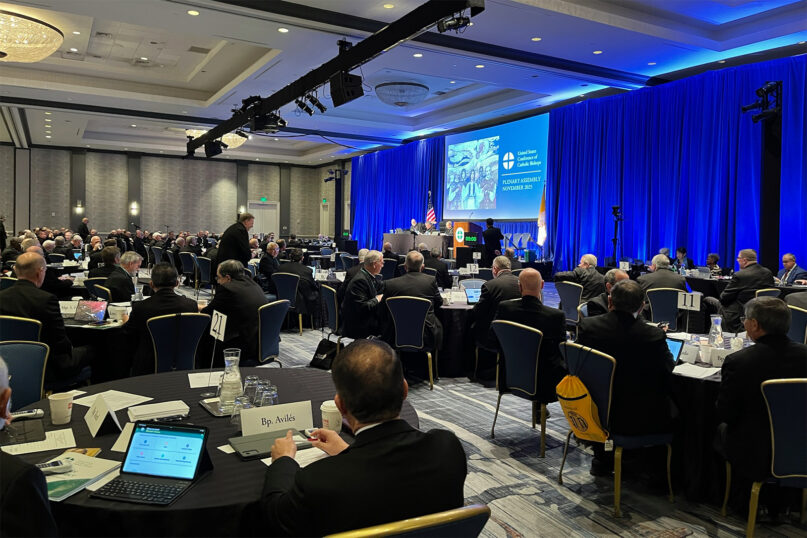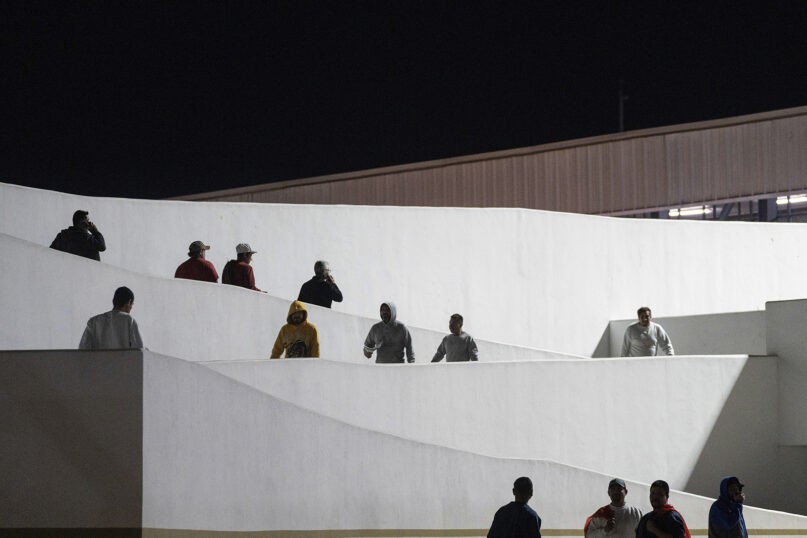BALTIMORE (RNS) — The U.S. Catholic bishops said they oppose “the indiscriminate mass deportation of people” in a special message at their November meeting on Wednesday (Nov. 12). Immigration was a major theme of the meeting, but the language of the statement came together at the last minute, as Cardinal Blase Cupich, archbishop of Chicago, said it was necessary for the conference to take a stronger stance.
“How can we say to the people who are suffering from this moment that we stand with you if we don’t clearly say that we are opposed to the indiscriminate deportation of people?” Cupich said, insisting the bishops should approve an amendment to the immigration statement they were set to release. Previously, Archbishop Timothy Broglio of the Archdiocese for the Military Services USA, who served as head of the bishops’ conference until a new leader was elected yesterday, had indicated he wished to move forward without an amendment process.
The United States Conference of Catholic Bishops, meeting in Baltimore this week, ultimately approved Cupich’s language to be included in the statement. In other parts of the statement, they addressed the impacts they are seeing in their communities as the Trump administration’s mass deportation campaign continues.
Releasing a rare “special message” seems to indicate the bishops are particularly concerned about immigration. They last gave a similar message at a 2013 meeting, rejecting the federal government’s mandate that health care plans cover contraception.
“We are disturbed when we see among our people a climate of fear and anxiety around questions of profiling and immigration enforcement,” the bishops wrote. “We are grieved when we meet parents who fear being detained when taking their children to school and when we try to console family members who have already been separated from their loved ones.”
They also wrote they were concerned about the “vilification of immigrants,” conditions and lack of access to pastoral care in immigration detention centers, immigrants losing their legal status and the “threats against the sanctity of houses of worship and the special nature of hospitals and schools,” referring to the removal of federal guidelines restricting immigration enforcement in those locations.

A small group of bishops led the creation of the message, including Boston Archbishop Richard Henning; El Paso, Texas, Bishop Mark Seitz; Arlington, Virginia, Bishop Michael Burbidge; and Brownsville, Texas, Bishop Daniel Flores, who was elected vice president of the conference at the meeting.
“We hope this draft does justice to the very important moment before us and to your very helpful recommendations,” Henning said to the bishops, explaining that their drafting committee had sorted through input from many in the conference.
The statement said “nations have a responsibility to regulate their borders” but explained the biblical basis for the church’s concern for immigrants. It also said the bishops support “meaningful reform of our nation’s immigration laws.”
“We pray for an end to dehumanizing rhetoric and violence, whether directed at immigrants or at law enforcement,” the bishops wrote. “We pray that the Lord may guide the leaders of our nation, and we are grateful for past and present opportunities to dialogue with public and elected officials.”
The bishops approved the statement with 216 in favor, five opposed and three abstentions. The bishops’ individual votes are private.
During the debate before the statement passed, several bishops expressed enthusiastic support. None opposed to it spoke out publicly.

“I think it is both compassionate for the concerns of migrants, and at the same time expressing the call for meaningful immigration reform, which I think is so much needed,” said Springfield, Illinois, Bishop John Paprocki. He celebrated the immigrant parishes in which he had grown up and served, and he said he recently had a priest in his diocese who had to leave the country for a year because of immigration problems.
Chicago Auxiliary Bishop José María Garcia Maldonado said that as a new immigrant bishop, he “wanted to express my sincere gratitude” for the statement and the welcome he received.
But San Jose, California, Bishop Oscar Cantú said he was concerned the statement wasn’t strong enough in supporting immigrants before Cupich’s amendment. In an interview after the statement was released, Cantú told RNS, “There was a hesitancy of offending anyone who has supported the administration or the Trump election, and it just seems to me that we’re beyond that point.
“ We’re pastors — we speak for the church, and in the prophetic tradition, the prophets were often outraged at situations that they saw,” he said, adding many Catholics’ “ lives have been altered tragically by the extreme crackdown on immigration, on migrants.”

Cantú said his diocese had not seen a lot of activity in President Donald Trump’s mass deportation campaign but that he anticipates that with billions of dollars allocated for immigration enforcement in the recent budget, they may soon feel the impact.
“ This is a population that truly does not have a voice, and we have to be a voice for those whose dignity has been violated,” he said.
Cantú was one of few bishops to name the U.S. president during the meeting’s public sessions or in private interviews. The bishops’ statement does not mention Trump.
The bishop said that hesitancy may be because “ a lot of Catholics voted for him — and a lot of Catholics who have been supportive of many of our dioceses.”
Leading from California may have given Cantú “some freedom to speak more clearly,” he said. But, he added: “ If we don’t have the courage as bishops — as pastors to speak the truth in defense of human dignity — then who will? And not only that, but then our moral voice is degraded for future issues, and people will cease to look to us for a moral voice.”
Original Source: